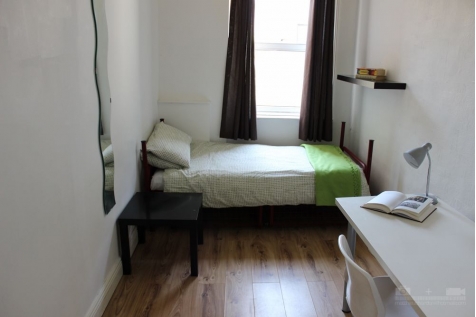
[dropcap]L[/dropcap]eaving home for the first time to study in college is simultaneously one of the most exciting and nerve-wracking things a young person can do, but with a housing market and academia still woozy from pandemic-related stress, all that excitement may have been swapped out for more nerves.
Students all throughout Ireland are currently facing an unprecedented and worsening accommodation crisis, as an abundance of students and a shortage of housing has forced many to take concessions and compromises to pursue their studies.
Many students have resorted to spending up to €400 per week on hotel rooms to attend their lectures, while others have opted to commute long distances with the hope that more places will become available soon.
DCU student Dan Hingerty is currently living in Killiney, as it’s the closest housing he could find to the college.
His commute takes him one hour and fifteen minutes and costs him €12 each day. He fears that this added time to his day will significantly worsen his college experience.
“I have to spend two and a half hours of my day on public transport… it has been a hindrance to my social life and has made studying more challenging,” he said.
Niamh Byrne, an arts student in Maynooth is in a similar situation. She is currently living in a digs in Dublin as it’s the closest housing she can find, and must commute every day to college.
Her concerns about this commute affecting her college life echo Dan’s, in that she fears both her social and academic life will suffer.
“[Where I’m living] has impacted my social life and my ability to meet new people in college,” she said.
“Commuting to college takes at least an hour out of my day. This has eaten into my study time, and any group work has been extra difficult to engage in.”
Meanwhile, some students have found the overall prospect of navigating through the crisis to be too daunting and have opted instead to defer for the year.
Prospective student Grace Campbell has been unable to find accommodation to attend her course in WIT and has said that her concerns about not living near the campus have discouraged her from even attending college this year.
“If I attended college this year, I wouldn’t have time for anything else,” she said.
She currently lives in County Wicklow and had intended on going to Waterford Institute of Technology. There are no direct transport routes from Wicklow to Waterford – meaning she would have to take a bus transfer; a process that could take up to two and a half hours.
“It would be very stressful to have to get two buses every day, each way, especially with how unreliable they can sometimes be,” she said.
“I would have had to go to sleep and wake up really early every day just so I could go to college. I simply wouldn’t have time to go to the gym or do my other projects.”
It is not uncommon for difficulties to transpire when seeking student accommodations in cities like Dublin, but this crisis appears to be on a national level. Smaller cities such as Limerick and Cork have seen an overwhelming number of students unable to find accommodation as well.
Covid-19 has been cited to be one of the main causes of this crisis for several reasons.
Many places which would typically house students for the academic year were no longer made available following last year’s remote learning method of delivery.
Due to a significant drop in the number of students seeking accommodation during the last academic year, landlords instead opted to rent their places out to more long-term tenants.
Now, as campuses open up again for this year, many of the available housing in the area has been taken off the market.
Additionally, due to last year’s remote learning, there has been a significantly higher number of second-year students seeking and competing for accommodation this year than usual.
Typically, many second-years would have used the experience and connections they’ve gained from the year prior to source accommodation with ease.
However, with second years having studied from home last year, their ability to attain these resources has been reduced greatly – leaving many of them to seek accommodation wholly inexperienced.
On top of this, this year’s Leaving Cert results were released significantly later than usual due to Covid-19 restrictions, leaving many first-year students with a much shorter window of time to make adjustments to their accommodation situation, should they need to, following the reception of their results.
Depending on the college and course, a student may have had as little as two weeks to find somewhere to move into.
Covid-19 has also disrupted the delivery of affordable housing to students, says Minister for Housing Darragh O’Brien.
“Last year we had a construction shutdown, and we were to deliver 33,000 homes… We are 13,000 short because of Covid,” he explains.
Aside from Covid, other factors contributing to this student crisis stem from the broader housing crisis.
What little housing that is available to students has been subjected to a rise in rent cost, with the Residency Tenancy Board saying that overall national rents grew by 4% year-on-year in the first quarter of 2021.
A report by Eurostudent in 2019 found that a student’s average income was €754 per month while their expenditure was €834 per month, a deficit of €78 per month.
In 2021, this has been expected to worsen due to rent rates increasing, and a lot of student’s potential income has been disrupted due to Covid.
Minister for Housing Darragh O’Brien has acknowledged the severity of the crisis but says that there are no immediate solutions.
“It’s not going to be solved overnight, but there is an immediate focus on the student accommodation issue right now,” he said.
He says that the only long-term solution lies with “delivering more homes.”
Claire Byrne Live are looking for students affected by this crisis to speak about their experiences and frustrations. Anyone interested in registering can contact Ross Boyd of the Student’s Union at ross@dcusu.ie.
Daniel Durand
Image Credit:



